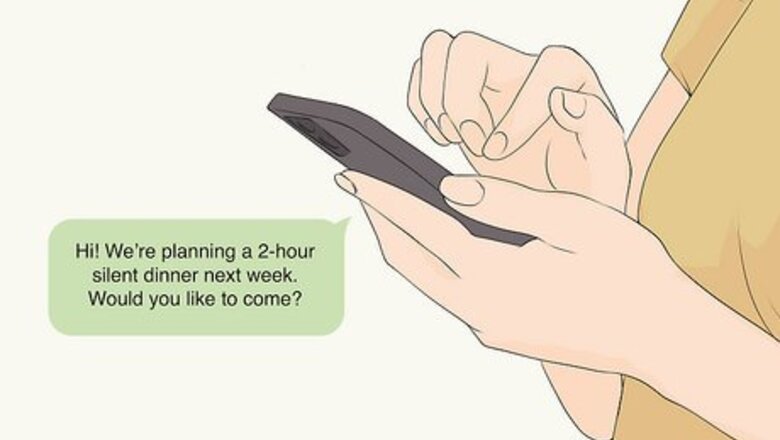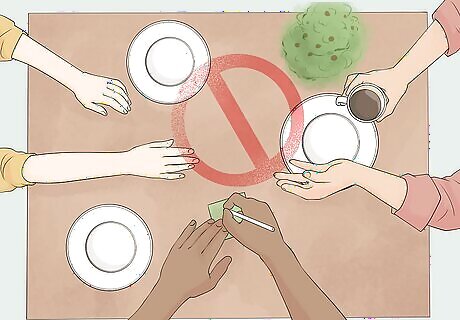
views
Announcing the Dinner

Invite your guests. In this respect, a silent dinner is like any other. Plan your guest list around who you would like to spend a silent 2-hour dinner with, and how many people you can comfortably feed and seat at your home. Give guests at least a week's notice in advance of your silent dinner; if possible, invite guests two weeks or a month in advance. Although it may seem an obvious choice to invite guests who are mutual friends and know each other, this is not mandatory.

Notify your guests about the party's unique set of restrictions. You may do this in whatever manner you choose. If you're sending out a traditional paper invitation, this could briefly state that the party will be a “silent dinner” and concisely state the dinner rules. If you're doing less formal invitations—by email, text, or in person—you'll have to inform each guest of the silent dinner rules. Alternately, you could plan to surprise your guests with the silent dinner. Invite your guests to an “experimental” dinner and, once they're at your house, explain the rules of the silent dinner party. You could also consider handing out small note-cards to your guests as they arrive at the party. Each note-card could state the rules of the silent dinner.

Set a time limit. You'll need to clarify in advance how long the silent dinner is going to last. Silent dinners commonly last for at least two hours. If you're planning to send an invitation to invite your guests, specify the duration of the silent dinner on the physical invitation. If you're going to inform your guests about the rules to the silent dinner when they arrive on your doorstep, make sure that you clarify to them how long the dinner will last. If the idea of a time limit seems too rigid or arbitrary, you could build the evening around a playlist. For example, put together two hours of music, and explain to guests that, once the music has concluded, they may finally speak.

Serve a meal that facilitates the silent theme. When planning the different dishes which will constitute your dinner, plan to provide items that do not require verbal communication to serve. You could plan to bring each guest a fixed plate of the evening's meal, or allow guests to serve themselves in the kitchen before the dinner begins. Alternately, plan to serve only one main dish so that guests will not need to pass serving plates or bowl around the table.
Establishing the Dinner Rules

Clarify that guests cannot speak to one another during the dinner. The first rule that guests should be made aware of is that, during the course of the silent dinner, speech is not allowed. Guests may not use any form of verbal communication with one another, including subdued or whispered speech. Hang a small sign on your front door which reminds incoming guests that they will not be permitted to speak once they've entered the silent dinner party. Naturally, all types of sound cannot be suppressed. Guests may laugh, sneeze, cough, etc., when appropriate. However, ask that guests strive to make as little sound as possible during the dinner. However, ask that guests make as little sound as possible—verbal or nonverbal—during the course of the dinner. This includes things like tapping fingers, scuffing chairs on the floor, etc.

Ask guests not to read or write. Just as guests should be discouraged from speaking to one another, you also need to make clear that guests cannot read or write. This includes passing written messages, texting on a phone, or reading from a book or magazine. The lack of writing and reading will allow guests to be more present during the meal. You and your guests will be better able to enjoy the reflective, subdued atmosphere of the silent dinner if no one writes or reads.

Explain to guests that they cannot use phones during the dinner. Guests at your silent dinner should immerse themselves fully in the experience. A guest pulling out their cell phone or tablet would not only distract other guests (and the host), but would indicate a lack of interest in the dinner itself. So, ask guests to put their phones on silent or turn them off for the duration of the dinner. The lack of phones, tablets, and other technology at the table will allow guests to better experience the meal, the silence, and the company they're spending a silent evening with.

Confirm that guests stay the full amount of time. The silent dinner is meant to create a communal space between yourself (the host) and the guests you have chosen to invite. It may take guests some time to acclimate to the uncommon dinner requirements, but they should stay until the end. The dinner will be diminished if one or more guests gets up to leave halfway through. Whether you mail your guests a physical invitation or explain to them the rules of the silent dinner once they walk in your front door, make it clear that guests are expected to stay for the full two hours.
Managing Your Guests

Encourage guests to communicate nonverbally. Although speech and written language are not permitted at a silent dinner table, guests are not obligated to sit in their chair without any interaction. Guests may communicate with one another non-verbally through eye contact, hand gestures, applause, or any other body language. If you have invited individuals who do not know one another, the guests can communicate and begin getting to know one another through nonverbal cues, glances, and hand gestures.

Present the atmosphere and food as the focuses of the evening. Your silent dinner should be a peaceful, relaxing event, without any of the noise-induced stress that accompanies many typical dinner parties, not to mention eating out at a restaurant. The atmosphere and the food should be your guest's main focuses. That said, don't feel like the food you serve will be under any special scrutiny or needs to be exquisite. A silent dinner should allow guests to focus on the experience of dining and the company around them, regardless of what's on the table. Unlike, for example, a typical business dinner, guests should not focus on networking or other interpersonal connections.

Speak with your guests before they leave. Once the two hours has expired (or, if you're timing the dinner with a prepared playlist, once the playlist has ended), you and your guests are free to speak. If any guests do not know each other, ask them to introduce themselves. Encourage light conversation around the table before guests begin to leave. This will eliminate any lingering awkwardness and encourage guests to get to know one another.




















Comments
0 comment